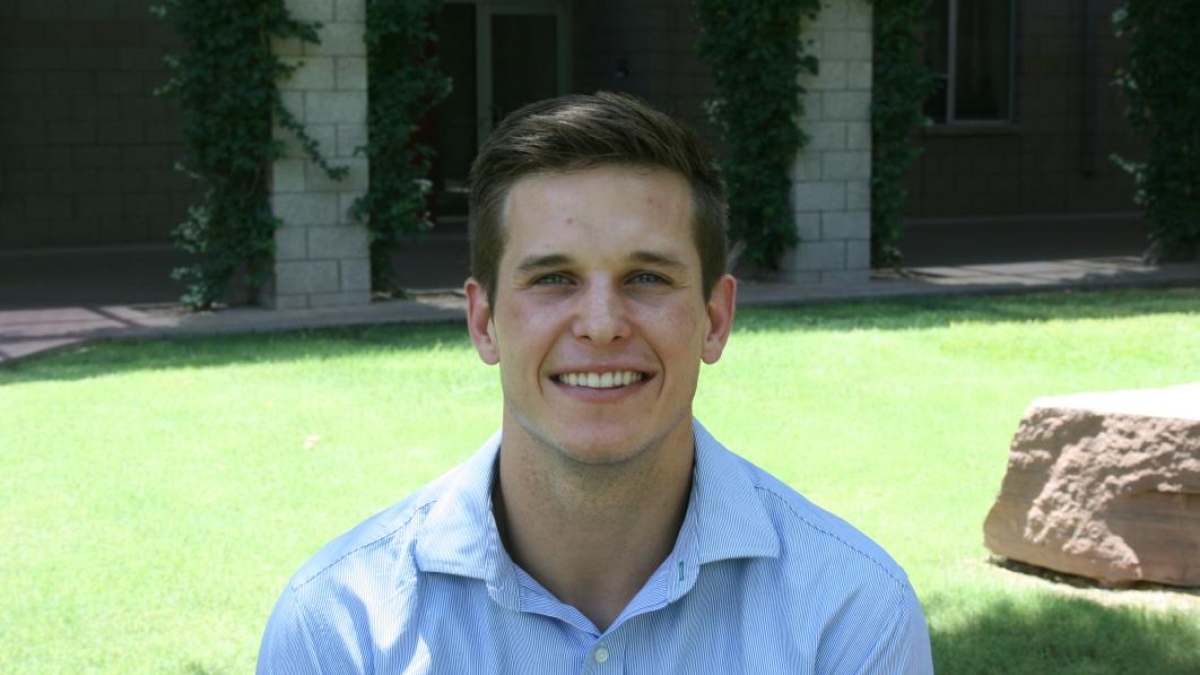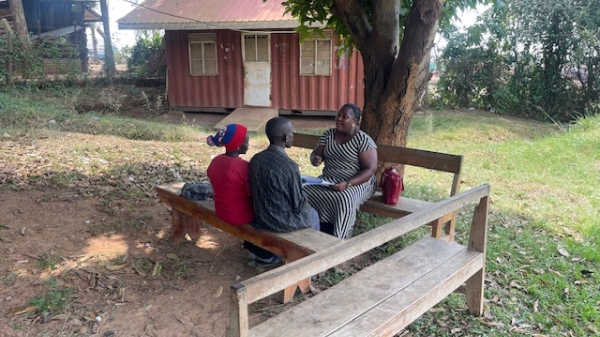ASU honors graduate off to medical school with $75,000 scholarship

Jacob Sorenson aspires to be a surgeon. He has completed an undergraduate degree in applied biological sciences at ASU and begins medical school this summer. Photos by Nicole Greason/Barrett Honors College
Editor’s note: This is part of a series of profiles for spring 2018 commencement.
Jacob Sorenson will graduate next week with a bachelor’s degree in applied biological sciences from the College of Integrative Arts and Sciences and honors from Barrett, the Honors College at Arizona State University.
He was awarded the Jack Kent Cooke Graduate Scholarship worth $75,000 for graduate school, which he will use when he begins his studies at the University of Arizona College of Medicine in July.
Sorenson, whose hometown is Mesa, Arizona, started at ASU Polytechnic campus in 2016 as a transfer student from Mesa Community College. He was one of 75 outstanding community college students from 21 states to receive the $40,000 Jack Kent Cooke Foundation Undergraduate Transfer Scholarship that year.
He entered the university with an impressive resume, including research on the correlation between the use of prenatal supplements and the occurrence of autism. He continued his research at ASU and is expecting it to be published soon.
While a community college student, he worked with schools in the Mesa Unified School District to create math activities for elementary-age special-needs students and started the Autism Lego Club of the East Valley, a group of families with autistic children that meets monthly. Children in the group play with Legos, an activity that helps build coordination and fine motor skills.
He also went on a two-year mission to Mozambique where he observed the work of health care providers in a strapped medical system where medication and supplies are in short supply. For six weeks during the summer of 2016 he went to Botswana to work with the Baylor College of Medicine Pediatric AIDS Initiative, learning how medication helps people with the virus survive.
“My time at ASU and Barrett has been incredible,” he said.
Here, he answers some questions about himself and his time at ASU.
Question: What was your “aha” moment, when you realized you wanted to study in the field you majored in?
Answer: I knew I would enter the field of medicine when I lived in Mozambique and worked with families for two years. I saw the impact medical professionals could make in the world and the sad outcomes that occurred without trained physicians. My desire to become a doctor was confirmed after I shadowed doctors over the past few years and worked in an HIV clinic in Botswana last summer.
Q: What is something you learned while at ASU — in the classroom or otherwise — that surprised you or that changed your perspective?
A: Throughout my academic career, I received many pieces of advice that stuck with me. One thing in particular that seems to rise above the rest is the fact that giving a bit of extra effort can have great effects. I realized this as I progressed through my undergrad. When I worked just a little harder, was a little kinder, reached out to professors a little more, it made a world of a difference and has allowed me to excel far beyond the average student.
Q: Why did you choose ASU?
A: I always believed I would come to ASU. I received a large scholarship that allowed me to have a full ride to any college in the United States. I had Columbia and Baylor in my sights, but ultimately chose ASU due to a close connection with my research professor, Dr. James Adams. With him, I was able to submit a very large thesis on the optimal prenatal supplement for the prevention of autism and other birth disorders. This research could greatly impact how we care for mothers during pregnancy and allow them to receive the correct vitamins and minerals with the correct dosage. We are finalizing the full recommendation soon and will publish the results in an academic journal.
Q: What is the best piece of advice you would give to those still in school?
A: Work hard. It is worth it. I continually think of how lucky I am to be able to have so many opportunities to work hard and make a difference. I could not imagine wasting time and wasting my abilities to impact other people’s lives. So, just work hard and be kind to others. This goes a long way with others and will put you much further ahead than you can imagine.
Q: What was your favorite spot on campus, whether for studying, meeting friends, or just thinking about life?
A: I had a great time at the Barrett lounge at the Polytechnic campus. It was much smaller than Tempe, but I like the smaller-campus feel. Even though there are still 10,000 students on campus, the outdoor areas on the mostly desert campus are a great getaway.
Q: What are your plans after graduation?
A: I recently was accepted to the University of Arizona College of Medicine and will be working my way to become a doctor! The hard work has finally paid off, and the journey is only beginning. I was awarded another large scholarship from the Jack Kent Cooke Foundation for $75,000 to attend any graduate school, so this will chip away at the cost of medical school. I hope to become a surgeon after medical school and go on to a residency that will allow me to learn and grow. I am beyond excited to begin medical school and continue to work toward my goals in life.
Q: If someone gave you $40 million to solve one problem on our planet, what would you tackle?
A: Oh my, what a question that is! Since I am going into the medical field, I see many problems that should be tackled in this field. When I was in Botswana at the HIV clinic, marvelous work was happening. Physicians from the United States with some of the best training in the world would assist and train doctors from Botswana to treat their patients. This has been happening at this clinic for many years, and they are to the point where they are self-sufficient and without the need of outside help.
I believe these sorts of projects need to be implemented throughout the world. Although it appears to some that our health care system is a mess here in the United States, I strongly believe we are lucky to have the best training in the world. Forty million dollars would go a long way to pay for projects that could use our physicians to train others throughout the world to combat sickness and disease in any country.
More Health and medicine

ASU researchers: Over-the-counter flu tests can 'revolutionize public health'
Influenza, more commonly known as the flu, causes 50,000-plus of deaths annually, but over-the-counter (OTC) tests for the…

The beauty bias
Being one of the beautiful people has its benefits, but according to a recent study, living longer may not be one of them. …

Pilot program to address HIV care, intimate partner violence in Uganda
Editor's note: This is the second in a five-part series about ASU faculty conducting summer research abroad. Read about carbon…